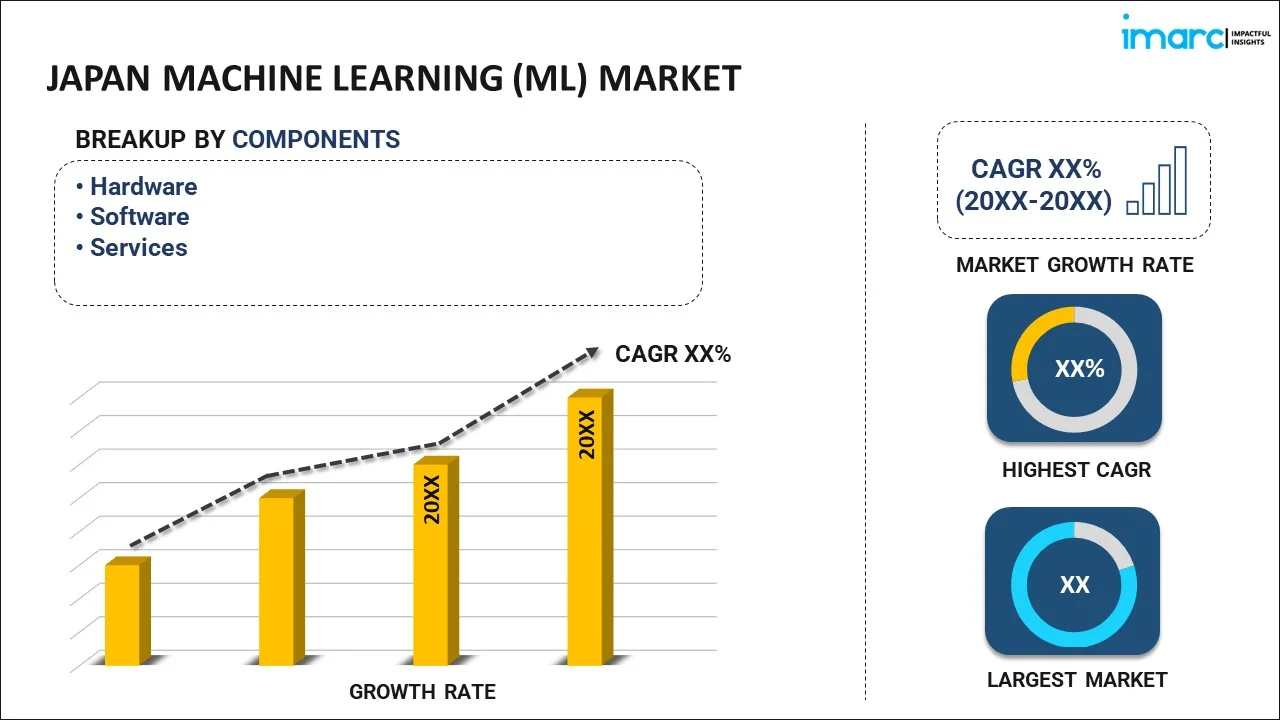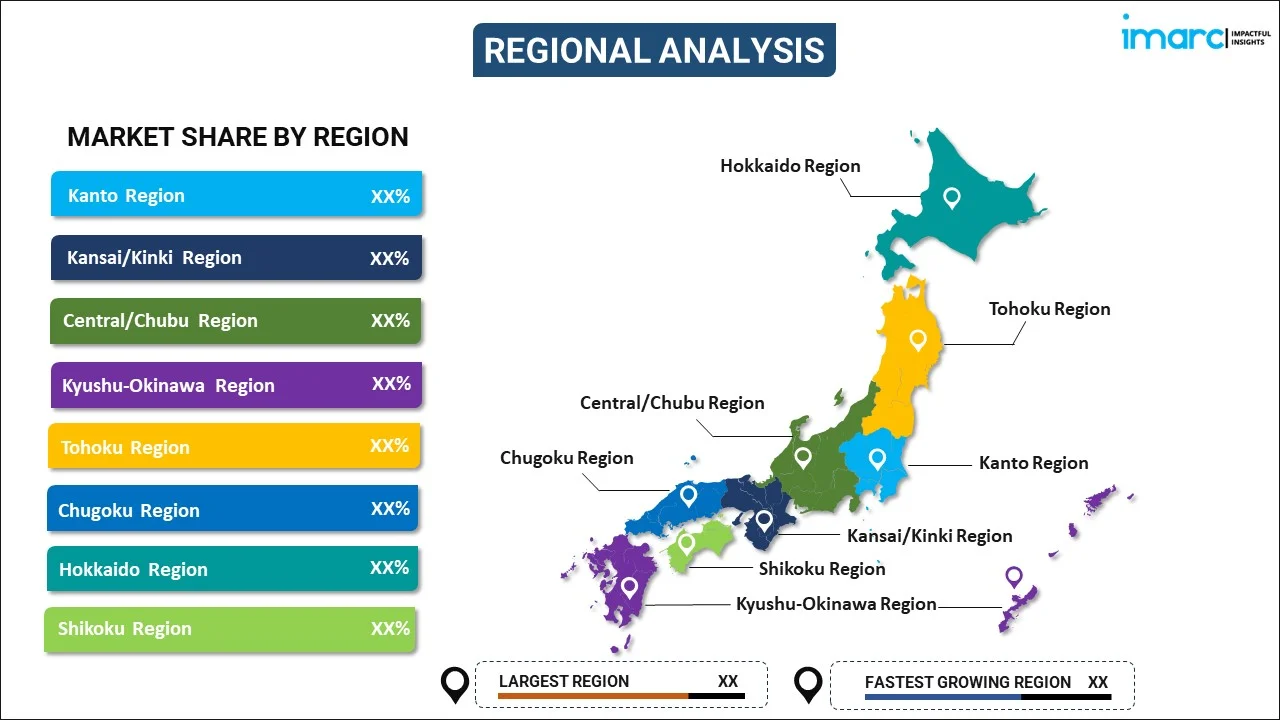
Japan Machine Learning (ML) Market Report by Component (Hardware, Software, Services), Deployment (Cloud-based, On-premises), Enterprise Size (Large Enterprises, Small and Medium-sized Enterprises), End Use (Healthcare, BFSI, Law, Retail, Advertising and Media, Automotive and Transportation, Agriculture, Manufacturing, and Others), and Region 2026-2034
Market Overview:
Japan machine learning (ML) market size reached USD 2.3 Billion in 2025. Looking forward, IMARC Group expects the market to reach USD 29.6 Billion by 2034, exhibiting a growth rate (CAGR) of 32.73% during 2026-2034. Increased adoption of artificial intelligence (AI) and machine learning (ML) technologies across industries, government investments in research and development (R&D) activities, rapid healthcare advancements, surging product application in financial sector, partnerships with startups and tech giants, and the accessibility of cloud-based ML services are factors boosting the market growth.
|
Report Attribute
|
Key Statistics
|
|---|---|
|
Base Year
|
2025
|
|
Forecast Years
|
2026-2034
|
|
Historical Years
|
2020-2025
|
| Market Size in 2025 | USD 2.3 Billion |
| Market Forecast in 2034 | USD 29.6 Billion |
| Market Growth Rate 2026-2034 | 32.73% |
Access the full market insights report Request Sample
Machine learning (ML) is a transformative branch of artificial intelligence (AI) that has gained immense popularity and utility in various domains. It is a data-driven approach to computer programming that enables systems to learn and improve from experience without being explicitly programmed. This is achieved through the utilization of algorithms that analyze and interpret data patterns, allowing the system to make predictions, decisions, and recommendations. ML has found applications in a wide range of fields, including healthcare, finance, e-commerce, and more. One of the key principles of how it works is the process of training models using large datasets. These models are designed to recognize patterns and relationships within the data. By exposing these models to vast amounts of information, they learn to make accurate predictions or classifications when presented with new, unseen data. Common ML algorithms include decision trees, neural networks, and support vector machines.
Japan Machine Learning (ML) Market Trends:
The Japan machine learning (ML) market is influenced by several key drivers, such as the increasing adoption of AI and ML technologies across industries such as healthcare, finance, manufacturing, and retail. Additionally, the Japanese government's initiatives and investments in AI and ML research and development (R&D) are fostering innovation, which is further driving market expansion. This is further bolstered by the growing need for automation and optimization of business processes, particularly in labor-intensive sectors like agriculture and logistics. Furthermore, the rise of Internet of Things (IoT) devices and data generation is creating opportunities for ML applications in data analytics and predictive maintenance, which is accelerating the market growth. Moreover, Japan's aging population and the healthcare sector's need for advanced diagnostic tools are also driving the integration of ML in healthcare solutions, which is boosting the market growth. Apart from this, key market players are increasingly partnering with ML startups and tech giants to harness AI and ML capabilities, which is positively supporting the market growth.
Japan Machine Learning (ML) Market Segmentation:
IMARC Group provides an analysis of the key trends in each segment of the market, along with forecasts at the country level for 2026-2034. Our report has categorized the market based on component, deployment, enterprise size, and end use.
Component Insights:

To get detailed segment analysis of this market Request Sample
- Hardware
- Software
- Services
The report has provided a detailed breakup and analysis of the market based on the component. This includes hardware, software, and services.
Deployment Insights:
- Cloud-based
- On-premises
A detailed breakup and analysis of the market based on the deployment have also been provided in the report. This includes cloud-based and on-premises.
Enterprise Size Insights:
- Large Enterprises
- Small and Medium-sized Enterprises
The report has provided a detailed breakup and analysis of the market based on the enterprise size. This includes large enterprises and small and medium-sized enterprises.
End Use Insights:
- Healthcare
- BFSI
- Law
- Retail
- Advertising and Media
- Automotive and Transportation
- Agriculture
- Manufacturing
- Others
A detailed breakup and analysis of the market based on the end use have also been provided in the report. This includes healthcare, BFSI, law, retail, advertising and media, automotive and transportation, agriculture, manufacturing, and others.
Regional Insights:

To get detailed regional analysis of this market Request Sample
- Kanto Region
- Kansai/Kinki Region
- Central/ Chubu Region
- Kyushu-Okinawa Region
- Tohoku Region
- Chugoku Region
- Hokkaido Region
- Shikoku Region
The report has also provided a comprehensive analysis of all the major regional markets, which include Kanto Region, Kansai/Kinki Region, Central/ Chubu Region, Kyushu-Okinawa Region, Tohoku Region, Chugoku Region, Hokkaido Region, and Shikoku Region.
Competitive Landscape:
The market research report has also provided a comprehensive analysis of the competitive landscape. Competitive analysis such as market structure, key player positioning, top winning strategies, competitive dashboard, and company evaluation quadrant has been covered in the report. Also, detailed profiles of all major companies have been provided. Some of the key players include:
- Amazon Web Services Inc
- Apple Inc.
- Google LLC
- Hewlett Packard Enterprise Development LP
- International Business Machines Corporation
- Microsoft Corporation
(Please note that this is only a partial list of the key players, and the complete list is provided in the report.)
Japan Machine Learning (ML) Market Report Coverage:
| Report Features | Details |
|---|---|
| Base Year of the Analysis | 2025 |
| Historical Period | 2020-2025 |
| Forecast Period | 2026-2034 |
| Units | Billion USD |
| Scope of the Report | Exploration of Historical Trends and Market Outlook, Industry Catalysts and Challenges, Segment-Wise Historical and Future Market Assessment:
|
| Components Covered | Hardware, Software, Services |
| Deployments Covered | Cloud-based, On-premises |
| Enterprise Sizes Covered | Large Enterprises, Small and Medium-sized Enterprises |
| End Uses Covered | Healthcare, BFSI, Law, Retail, Advertising and Media, Automotive and Transportation, Agriculture, Manufacturing, Others |
| Regions Covered | Kanto Region, Kansai/Kinki Region, Central/ Chubu Region, Kyushu-Okinawa Region, Tohoku Region, Chugoku Region, Hokkaido Region, Shikoku Region |
| Companies Covered | Amazon Web Services Inc, Apple Inc., Google LLC, Hewlett Packard Enterprise Development LP, International Business Machines Corporation, Microsoft Corporation, etc. |
| Customization Scope | 10% Free Customization |
| Post-Sale Analyst Support | 10-12 Weeks |
| Delivery Format | PDF and Excel through Email (We can also provide the editable version of the report in PPT/Word format on special request) |
Key Questions Answered in This Report:
- How has the Japan machine learning (ML) market performed so far and how will it perform in the coming years?
- What has been the impact of COVID-19 on the Japan machine learning (ML) market?
- What is the breakup of the Japan machine learning (ML) market on the basis of component?
- What is the breakup of the Japan machine learning (ML) market on the basis of deployment?
- What is the breakup of the Japan machine learning (ML) market on the basis of enterprise size?
- What is the breakup of the Japan machine learning (ML) market on the basis of end use?
- What are the various stages in the value chain of the Japan machine learning (ML) market?
- What are the key driving factors and challenges in the Japan machine learning (ML)?
- What is the structure of the Japan machine learning (ML) market and who are the key players?
- What is the degree of competition in the Japan machine learning (ML) market?
Key Benefits for Stakeholders:
- IMARC’s industry report offers a comprehensive quantitative analysis of various market segments, historical and current market trends, market forecasts, and dynamics of the Japan machine learning (ML) market from 2020-2034.
- The research report provides the latest information on the market drivers, challenges, and opportunities in the Japan machine learning (ML) market.
- Porter's five forces analysis assist stakeholders in assessing the impact of new entrants, competitive rivalry, supplier power, buyer power, and the threat of substitution. It helps stakeholders to analyze the level of competition within the Japan machine learning (ML) industry and its attractiveness.
- Competitive landscape allows stakeholders to understand their competitive environment and provides an insight into the current positions of key players in the market.
Need more help?
- Speak to our experienced analysts for insights on the current market scenarios.
- Include additional segments and countries to customize the report as per your requirement.
- Gain an unparalleled competitive advantage in your domain by understanding how to utilize the report and positively impacting your operations and revenue.
- For further assistance, please connect with our analysts.
 Request Customization
Request Customization
 Speak to an Analyst
Speak to an Analyst
 Request Brochure
Request Brochure
 Inquire Before Buying
Inquire Before Buying




.webp)




.webp)












